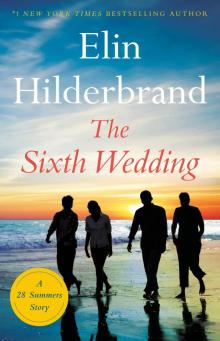- Home
- Elin Hilderbrand
What Happens in Paradise Page 6
What Happens in Paradise Read online
Page 6
Huck lights a cigarette and inhales deeply. “So you’ll leave in May, then? Or June?”
“A week from Tuesday,” Adam says.
A week from Tuesday, Huck thinks.
“Oneonta in January,” Huck says. “Must be love.”
That night after dinner—fresh, perfectly grilled wahoo that even Maia agrees is sublime—Huck heads out to the deck with his pack of Camel Lights and his cell phone.
Agent Vasco or Irene? He decides on one, then changes his mind and decides on the other. Then back, then back again.
Irene.
He’s almost more nervous about calling her than about calling the FBI. He is more nervous about calling her because he has no idea how the conversation will go.
She answers on the first ring. “Oh, Huck, is that you?”
Her voice stirs something in him. He exhales smoke. “It’s me.” He pauses. He had planned to say, I’m calling to check on you. Or I’m calling to see how you’re doing. But instead the words that fly out of his mouth are “I have a business proposition. My first mate, Adam, quit on me today and I can’t properly run my charter without a mate. So I’m calling to offer you a job.”
There’s a pause long enough for Huck to take a drag off his cigarette, consider the lights of the Westin below and the cruise ship headed to St. Croix in the distance, and castigate himself for acting like a fool. He should have gone with How’ve you been?
“What does it pay?” Irene asks.
He grins and tells her the truth. “Hundred bucks for a half day, two hundred for a full day,” he says. “Plus tips.” He clears his throat. “Plus fish.”
“That sounds fair,” she says. “When do I start?”
He has to rein in the joy in his voice before he makes the second call. He clears his throat, takes a cleansing breath, lights another cigarette, and dials.
“Colette Vasco.”
“Agent Vasco, this is Sam Powers calling from St. John. I’m Rosie’s—”
“Yes, hello, Captain Powers,” Agent Vasco says. “I’m sorry, I don’t have any further news—”
“I have news,” Huck says. He lowers his voice in case Maia happens to pop out of her room in search of some Ben and Jerry’s Brownie Batter Core. “I found a hundred and twenty-five thousand dollars hidden in a dresser drawer in Rosie’s room. I thought you would want to know.”
“Yes,” Agent Vasco says. “Yes, you’re certainly right about that. What would be a good time tomorrow for me to stop by?”
Baker
When he tells his “school wives”—Wendy, Becky, Debbie, and Ellen—that Anna has asked him to get a sitter for Floyd so that she and Louisa can take Baker to dinner at Indigo and “civilly discuss arrangements,” they all start talking at once.
“Don’t let them railroad you,” Wendy says. “Ask for full custody if that’s what you want.”
Debbie slides a business card across the table: Perla Piuggi, Esq. “My divorce attorney,” she says. “Pitbull.”
“We’ve agreed to do mediation,” Baker says.
“Using words like civilly and mediation nearly always means an ambush is coming,” Becky says.
Baker slips the card into his pocket.
“I’m dying to eat at Indigo,” Ellen says. “Their tasting menus are the talk of the city. It’s neo–soul food.”
“I’m in,” Wendy says. “Let’s book a table the same night.” She cackles. “That way if things go south, you can come sit with us.”
“I thought Anna ate only pizza,” Debbie says. “Didn’t you tell me Anna hated going out to fancy places?”
“She was always too tired,” Baker says.
“But not anymore,” Ellen says with an eye roll.
“Call the lawyer,” Debbie says.
“And report back,” Wendy says.
“Also, take a picture if you can,” Becky says.
Debbie swats her hand. “We sound like a pack of catty teenagers.”
“I want to see if Anna looks happy,” Becky says. “I want to see if she has that glow.”
“Imagine,” Wendy says. “Anna, happy.”
Ellen wasn’t wrong; Indigo is a unique experience with its own set of rules and a robust social conscience—which must be why Louisa picked it (Baker assumes that Louisa picked it, since what Debbie said is true—Anna eats only pizza). There are only thirteen seats at a horseshoe-shaped bar, making for a communal experience, which Baker figures is both good and bad. On the one hand, things can’t possibly get too ugly in such a controlled environment, but on the other, their civil discussion of arrangements might become a group-therapy session. They are, blessedly, placed at the far side of the horseshoe with Baker agreeing to take the seat on the end, in a relatively dim corner. Louisa is next to him, Anna on the other side of Louisa. This feels weird and wrong—shouldn’t he be sitting next to Anna so they can talk about Floyd? And yet, it’s also symbolic; Louisa is, in fact, the person who came between Baker and Anna, as the seating now illustrates.
They’re asked to select their tasting menu; they can choose carnivore, omnivore, or pescatarian-chordate.
Pescatarian means fish, Baker knows. He hasn’t a clue about chordate, but listed underneath is the word amphibian, which probably means frogs’ legs, but it’s too risky to chance it. Baker chooses carnivore with a first course called Turtlenecks and Do-Rags, and the ladies—women!—choose omnivore and will enjoy a first course called Descendants of Igbo, which is apparently yams with marshmallows.
This place is truly an alternate universe, but at least it serves as a distraction.
Anna, not one for small talk, leans forward and says, “Louisa was offered a position in the neonatal cardiothoracic surgery department at the Cleveland Clinic and she’s going to take it, and she persuaded them that two heart surgeons are better than one, so they’ve offered me a job as well.”
“Turns out, they’re even more excited to get the great Anna Schaffer than they are to get me,” Louisa says, and she covers Anna’s hand with her own.
Baker gazes at the two of them. They seem like strangers to him, like people he’s met at jury duty. Anna is wearing her hair down and it looks lovely, like a dark velvet curtain. Louisa’s hair used to be dark and long like Anna’s—Baker has known her long enough to remember this—but now she has cut it very short and dyed it platinum blond. They’re both glowing; they’re both happy. It’s obvious that they’re in love, that they’re a couple. None of the other ten diners tonight would ever guess that Baker and Anna are the people who are married.
Immediately after making this observation, he processes the words Cleveland Clinic. They’re both taking positions at the Cleveland Clinic, which, if Baker isn’t mistaken, is in Cleveland.
He feels like he has to double-check. Hospitals all have satellite campuses these days.
“Are you talking about the Cleveland Clinic in…Cleveland?” he asks.
Louisa’s head bobs and he notices her grip on Anna’s hand tighten. “Yes, Baker,” she says. It’s probably not her intent to speak to him like he’s a moron but that’s pretty much what she’s doing. “We’re relocating to Cleveland.”
“Not with Floyd,” Baker says. “You aren’t taking my son to Cleveland.”
“That’s what we wanted to talk to you about,” Anna says. “There’s more than one way to look at this.”
“Oh, really,” Baker says. He runs his eyes along the horseshoe to the opposite side, hoping that he will see his four friends eating amphibians. He needs them now because it’s becoming clear that this is an ambush. Anna and Louisa have accepted positions at the Cleveland Clinic. They’re moving to Cleveland, Ohio!
“Yes, really,” Anna says. The server arrives with Anna’s and Louisa’s Descendants (yams) and Baker’s Turtlenecks and Do-Rags, which appears to be a crab dish (not actual turtles’ necks). Louisa and Anna dig in, but Baker can’t even remember how to use his cutlery. “Our first choice would be for you and Floyd to come to Cleveland.”
“You can do your job from anywhere,” Anna says. “You don’t have to be in Houston.”
“But…we have a house, Floyd has school, we have friends in Houston. A community. A life.”
Anna scrapes yams out of the bowl. “The deepest roots we have in Houston are mine, at the hospital. And I’m willing to pull those up for this opportunity.”
Baker stares at his crab, fervently wishing that Wendy, Becky, Debbie, and Ellen were here so he could inform them that his friendship with them is, according to Anna, shallow—or at least, not as deep as Anna’s career. The woman is so cold, so dispassionate, Baker can’t believe he ever decided to marry her. Good luck to Louisa!
“You and Louisa go to Cleveland,” Baker says. “Floyd and I will stay here. I’ll send him up to you on his vacations.”
“That’s our third choice,” Louisa says. “A distant third, because we’d obviously like to remain a cohesive family unit.” Baker very much resents her chiming in at all. She stole Baker’s wife and now she’s dragging her to Ohio. It’s clear that Louisa is maintaining some kind of utopian vision of the three of them as the parents in this “cohesive family unit,” with Anna and Louisa as the breadwinners and Baker as Floyd’s primary caregiver. “But we want to keep the transition as harmonious as possible, for Floyd’s sake. So we can try that option for the first year if you insist upon it. You and Floyd stay here and we’ll set up a realistic visitation schedule—holidays and summers.”
“Great,” Baker says. “You can be the Disneyland parents.” This is Debbie’s term. Her ex-husband, Jaybee, takes her kids only three weeks per year—to Martha’s Vineyard over the summer, to Aspen at Christmas, and to a different European city each spring. Baker considers the two very serious, accomplished women—people!—on his left. Sorry to say, they are no one’s idea of Disneyland parents.
And yet, this plan works for Baker. Because he is not moving to Cleveland.
“You should also know…” Anna says, and for the first time during this unpleasant and confusing dinner, she seems ill at ease.
“That I’m planning on getting pregnant,” Louisa finishes. She considers the yams and marshmallows on the end of her fork. “Using a sperm donor.”
The words sperm donor should never be uttered during dinner, Baker thinks. He has just lost his appetite.
Their server takes advantage of the pause in their conversation to whisk away their first-course dishes—Baker’s untouched—and set down the Homogenization of Mandingos (venison sausage with beets) for Baker and the Belly of the Beast (boar ribs) for the ladies. Women. People. Baker has some other words to describe them at this point, words that don’t fall in the category of “civilly discussing arrangements.”
“So Floyd will have a half brother or half sister, in a sense, and we obviously want them to have a relationship,” Anna says.
“Cohesive family unit,” Louisa says again. Those are her buzzwords, and it takes all of Baker’s willpower to keep from shouting at her that Anna, Baker, and Floyd are—were—the family unit. Louisa is the interloper. The homewrecker!
Baker reaches for his beer, which he’s been too distracted to drink. He takes a long sip, buying himself time. Anna has left herself wide open here.
“I thought you said you didn’t want any more children,” Baker says. “You were adamant about it, in fact. And now you’re talking about a baby.”
“Louisa will have the baby,” Anna says.
“And yet you want a cohesive family unit,” Baker says. “So you’ll be co-parents.”
“Of course,” Anna says, shrugging. She doesn’t meet Baker’s eyes because, very likely, she doesn’t want to provoke him into describing what having Dr. Anna Schaffer as a co-parent was like. It was like…having no co-parent at all! But Baker decides he won’t tell Louisa this; he’ll let her find out on her own. Two busy surgeons at the Cleveland Clinic, one baby—what could go wrong?
“Well,” Baker says. “Congratulations.” He picks up his fork. Suddenly, the whole situation seems amusing—and maybe even fortunate? Anna and Louisa are leaving town. Floyd will see them for vacations and holidays, which on the surface appears sad and pathetic. He’s a four-year-old boy; he needs his mother. But Baker is in a position to know that Floyd doesn’t need Anna. He’s been fine this long without her. Maybe Anna will be more engaged as a parent when the job is taken in small bites.
Anna smiles at him; her glow returns. “Thank you for being so understanding,” she says. “And please know that whatever financial resources you want, we’ll provide. You can keep the house; there will be support for Floyd and support for you as well.”
He’s being paid off, but he doesn’t care. He cuts into his venison sausage. He can’t wait to get home and call his friends.
He starts with Ellen because, really, theirs is the closest relationship, and Ellen is a single mother by choice, so she is savvy and resourceful by nature.
He tells her everything—including the esoteric menu items at dinner—and with each new revelation, she gasps.
Louisa offered job at Cleveland Clinic.
Anna offered job at Cleveland Clinic.
Louisa and Anna moving to Cleveland.
Louisa and Anna offering to move Baker and Floyd to Cleveland.
Louisa and Anna offering to take on the role of Disneyland parents while Baker keeps Floyd in Houston.
Louisa having a baby with sperm donor, Anna agreeing to co-parent. Anna and Louisa promising to support Baker and Floyd financially.
At the end, Ellen says, “On the surface, this sounds…great for you. Really great. Anna and Louisa are out of your hair, you get to keep Floyd and the house, and they’re going to pay you…”
“But?” Baker says.
“Doesn’t it seem too good to be true?” Ellen says. “Like something doesn’t add up? I know Anna isn’t the most hands-on mother, but is she really going to move twelve hundred miles away from her son and see him only at Christmas?”
“And summers,” Baker says weakly. He, too, feels uneasy now, but he can’t tell if it’s because he thinks Anna is going to renege and possibly sue him for custody—which is what it would take for her to get Floyd—or if he’s just embarrassed about marrying a woman who really just isn’t maternal. At all. “Listen, I know it sounds unconventional, but think about Anna. This scenario is perfect for her. She doesn’t have time to parent. I’m concerned about Floyd spending the entire summer with her because you and I both know that means he’ll have a full-time nanny. He’s better off with me.”
“Agreed,” Ellen says. She takes a sip of what he can only assume is 8th Wonder IPA (she’s a craft-beer fanatic) and says, “So my brilliant-best-friend mind now wonders why you would even stay in Houston. With Anna leaving, you’re free to go wherever you want.”
Ellen’s tone is heavy with innuendo. She’s the only one in the group that he’s told about his father dying in the Caribbean, the fifteen-million-dollar villa, and…Ayers. She’s the only one he’s told about Ayers.
That night, the carnivore tasting menu churns in Baker’s stomach as he scrolls through every reason why he shouldn’t leave Houston for good and move down to St. John. He starts with the reasons he gave Anna.
They have a house here.
Well, the house is a house. He can sell it or rent it or leave it be until he sees how things work out down in the islands. He and Anna bought it outright when they moved from Chicago, so there’s no mortgage, only taxes, insurance, and maintenance.
Floyd has school. They have friends, a community, a life.
Floyd is four. He goes to Montessori. He’s not a sophomore in high school; he’s not even in middle school. If they leave Houston now, it’s possible Floyd won’t have any memories of the place, much less feel resentful about moving. Floyd can already read and count to a hundred. Baker should investigate the schools in St. John, make sure there’s somewhere suitable.
Friends. Community. Baker is c
hairperson of the Children’s Cottage annual benefit auction, which is in two weeks. Baker’s work on the auction is basically done; all of the items have been solicited. He bought a table for three thousand dollars and invited all his school wives. He should really attend.
But it’s not necessarily a reason to stay. The auction will happen, the school will make money, the auction will be over.
Would Anna object to Floyd living in the Virgin Islands? She’s seen the villa; she knows it’s comfortable. She’d be concerned about the schools. Baker will look into it first thing in the morning. Maia goes to school. Maia is…Floyd’s aunt. Okay, that’s a little weird. But maybe not. It’s late, Baker is tired, everything seems weird.
Louisa wants to have a baby, essentially a half brother or half sister for Floyd.
Baker would love to have more kids.
Ayers. Baker knew the instant he saw her that he wanted to marry her. They’d ended on bad terms—really bad—and she said she was back with Mick. That means she’s having sex with Mick, Baker thinks, maybe even this very second, which is enough to make him sick. But he needs to think realistically about sex. Sex is ephemeral. Once it’s over, it’s over. Sex is not a lasting connection; it’s only real while it’s happening. It’s not love.
Besides, Mick cheated on Ayers, and once a cheater, always a cheater. If Baker is confident of anything, it’s that Mick will blow it and Baker will be there to show Ayers how she deserves to be treated.
Ayers hadn’t wanted to get serious about Baker because he was a tourist.
If Baker moves into his father’s villa, he will be a tourist no longer.
Bright and early the next morning, Baker books two tickets to St. Thomas with a return flight in two weeks so that he and Floyd will arrive back the day before the auction. Then, assuming all goes well on St. John, after the auction they will move back permanently. This trip will be an exploratory mission, a toe dipped in to test the waters.

 What Happens in Paradise
What Happens in Paradise Reunion Beach
Reunion Beach The Sixth Wedding
The Sixth Wedding 28 Summers
28 Summers Summer of '79: A Summer of '69 Story
Summer of '79: A Summer of '69 Story Troubles in Paradise
Troubles in Paradise The Perfect Couple
The Perfect Couple Winter Solstice
Winter Solstice Barefoot: A Novel
Barefoot: A Novel